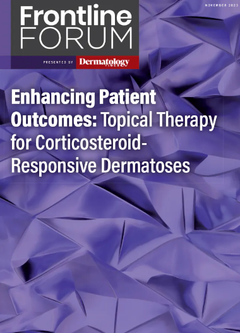
Benefits of Improved Vehicle of Dermatological Steroidal Treatments
Experts in dermatology discuss the benefits of improved topical steroidal vehicle excipients and their impact on treatment duration and response.
Episodes in this series

Linda F. Stein Gold, MD: As you mentioned, patients especially…they want to use a steroid, they might use it on larger body surface areas. We do have and we talked about…the fact that we now have more sophisticated…designer vehicles…where we get more of [those] depot effects, where we don’t see the drug really transitioning all the way through the epidermis but more staying at the site of action as opposed to just going rapidly through and into the systemic circulation. Do either of you find value in that?
Darren West, MPAS, PA-C: [A]bsolutely. But…that’s why…today we’re more comfortable writing [prescriptions for] steroids as well as they’re just better…. The vehicle will matter...in many instances. Unfortunately, I can’t get great products for all my patients, but those I can get them to, I love those newer products. And yes, it’s more effective, it’s safer. And I know I worry much less about any of those secondary [adverse] effects because of it.
Linda F. Stein Gold, MD: Jayme, do you agree?
Jayme M. Heim, MSN, FNP-BC: I agree. They’re using it for a shorter duration of time. They’re much more effective. And [there is] the fact that they’re actually more cosmetically elegant for the patients—[for] patients to not have grease all over everything, all over their clothing or else…they have a screen that’s just sitting on their skin the whole time, and it’s really not doing what it really effectively needs to do. So, our new agents…are nice. But like Darren said…not all our patients get access to that type of medication.
Linda F. Stein Gold, MD: I agree with you both…. [W]hen somebody comes in and they have an acute problem, they have contact dermatitis, I know it’s going to go away no matter what I give them; I’m often going to pick a generic that’s going to be cheap and easy. It’s those patients who have those chronic diseases where I know that they’re going to have to put on a medication in bursts over the course of time. That’s one [instance where] I’m a little more selective and really looking for a drug with more of a designer vehicle that I know potentially is safer for the long term, more cosmetically [elegant]. I might have to fight a little bit more with insurance. But I think for a chronic condition…patients appreciate it a little bit more.
Transcript is AI-generated and edited for clarity and readability.
Newsletter
Like what you’re reading? Subscribe to Dermatology Times for weekly updates on therapies, innovations, and real-world practice tips.

















